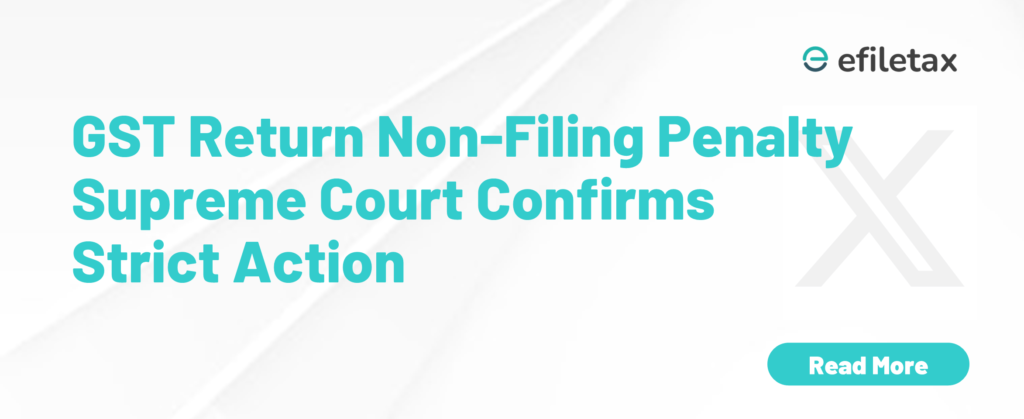
GST Return Non-Filing Penalty Supreme Court Confirms Strict Action
The Supreme Court has ruled that penalties imposed for non-filing of GST returns and non-payment of taxes are legally valid, strengthening the government’s crackdown on non-compliance under GST.
This decision sets a clear precedent for all taxpayers and businesses to ensure timely filing of GSTR-3B, GSTR-1, and payment of due tax, or risk facing serious financial consequences.
Let’s simplify the legal implications of this judgment and what it means for GST compliance.
What Was the Case About?
In Union of India vs Bharti Airtel Ltd. (2024) and related rulings, the issue revolved around:
- Whether late fees and interest imposed under Section 50 of CGST Act were enforceable if returns were not filed
- Whether technical glitches or input mismatch can be a ground to delay returns
Verdict: The Supreme Court upheld the government’s right to impose penalties and interest, affirming the legislative intent behind Section 39 and 50 of CGST Act.
What Happens If You Don’t File GST Returns?
Non-filing of GST returns attracts automated penalties, and now, after this ruling, there’s no scope for relaxation without valid legal grounds.
Here’s what applies:
| GST Default | Consequence |
|---|---|
| Not filing GSTR-3B | ₹50/day (₹25 CGST + ₹25 SGST), capped to ₹5,000 |
| Delayed tax payment | 18% interest p.a. on the outstanding amount |
| Filing after notice (Section 62) | Best judgment assessment + penalty under Section 122 |
| Continual non-filing | GST Registration cancellation + recovery actions |
Legal Backing for Penalty
- Section 39(1): Mandates filing of returns
- Section 50(1): Imposes interest on delayed tax
- Rule 68 of CGST Rules: Late fee auto-generated
- Section 62: Allows best judgment assessment for non-filers
- SC Judgement (2024): Reinforces all the above as legally valid
Key Takeaway: Even technical issues, like GSTR mismatch or portal errors, may not be accepted as a valid excuse unless proven with evidence.
Expert Insight: Avoiding Penalty in Practical Terms
CA Sandeep Mishra, a GST compliance expert, suggests:
“Ensure auto-reconciliation every 10th of the month. Tools like GSTR-2B matching and vendor tracking can reduce errors. Always file ‘nil return’ rather than skipping return filing — penalties apply even on nil liability.”
How to Stay Compliant (Simple Checklist)
- ⏱️ Mark your return dates: GSTR-1 and 3B due monthly or quarterly
- 📊 Reconcile with GSTR-2B: Before every filing
- 💼 Use auto-fill tools: From GSTN or private providers
- 📧 Respond to DRC-01A notices: Immediately
- 📥 Save proof of payment and filing acknowledgment
Frequently Asked Questions (FAQs)
Q1: If I file late, will both interest and penalty apply?
Yes. Interest under Section 50 and late fee under Rule 68 both apply separately.
Q2: Is penalty waived during technical glitches?
Only if CBIC issues a specific circular or clarification. General excuses are not accepted.
Q3: Can I file nil return to avoid late fee?
Yes, but it must be timely. Delayed nil returns also attract late fees.
Summary
The Supreme Court has confirmed that GST late fees and interest are enforceable under Sections 39 and 50 of CGST Act. Non-filing or late filing of returns attracts automatic penalties, emphasizing the importance of timely GST compliance for businesses and individuals.